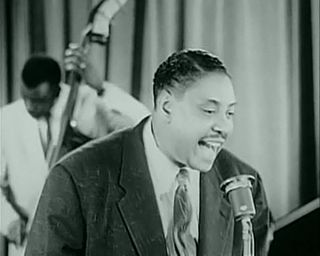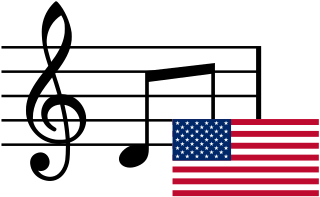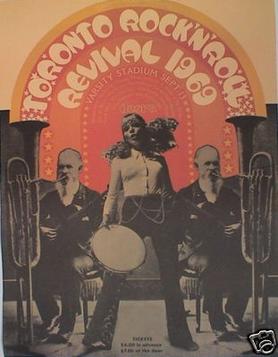
Ellas Otha Bates, known professionally as Bo Diddley, was an American guitarist and singer who played a key role in the transition from the blues to rock and roll. He influenced many artists, including Buddy Holly, Elvis Presley, the Beatles, the Rolling Stones, the Animals, George Thorogood, Syd Barrett, and the Clash.
Rock and roll is a genre of popular music that evolved in the United States during the late 1940s and early 1950s. It originated from African American music such as jazz, rhythm and blues, boogie-woogie, electric blues, gospel, jump blues, as well as country music. While rock and roll's formative elements can be heard in blues records from the 1920s and in country records of the 1930s, the genre did not acquire its name until 1954.

Rhythm and blues, frequently abbreviated as R&B or R'n'B, is a genre of popular music that originated within African-American communities in the 1940s. The term was originally used by record companies to describe recordings marketed predominantly to African Americans, at a time when "rocking, jazz based music ... [with a] heavy, insistent beat" was becoming more popular. In the commercial rhythm and blues music typical of the 1950s through the 1970s, the bands usually consisted of a piano, one or two guitars, bass, drums, one or more saxophones, and sometimes background vocalists. R&B lyrical themes often encapsulate the African-American history and experience of pain and the quest for freedom and joy, as well as triumphs and failures in terms of societal racism, oppression, relationships, economics, and aspirations.

Doo-wop is a subgenre of rhythm and blues music that originated in African-American communities during the 1940s, mainly in the large cities of the United States, including New York, Philadelphia, Pittsburgh, Chicago, Baltimore, Newark, Detroit, Washington, D.C., and Los Angeles. It features vocal group harmony that carries an engaging melodic line to a simple beat with little or no instrumentation. Lyrics are simple, usually about love, sung by a lead vocal over background vocals, and often featuring, in the bridge, a melodramatically heartfelt recitative addressed to the beloved. Harmonic singing of nonsense syllables is a common characteristic of these songs. Gaining popularity in the 1950s, doo-wop was "artistically and commercially viable" until the early 1960s and continued to influence performers in other genres.

Many musical styles flourished and combined in the 1940s and 1950s, most likely because of the influence the radio had in creating a mass market for music. World War II caused great social upheaval, and the music of this period shows the effects of that upheaval.
Oldies is a term for musical genres such as pop music, rock and roll, doo-wop, surf music from the second half of the 20th century, specifically from around the mid-1950s to the 1980s, as well as for a radio format playing this music.

Sha Na Na was an American rock and roll and doo-wop revival group formed in 1969. The group performed a song-and-dance repertoire based on 1950s hit songs that both revived and parodied the music and the New York City street culture of the 1950s. After gaining initial fame for their performance at the Woodstock Music and Art Fair, made possible with help from their friend Jimi Hendrix, the group hosted Sha Na Na, a syndicated variety series that ran from 1977 to 1981.

Music history of the United States includes many styles of folk, popular and classical music. Some of the best-known genres of American music are rhythm and blues, jazz, rock and roll, rock, soul, hip hop, pop, and country. The history began with the Native Americans, the first people to populate North America.
The London Rock and Roll Show was a concert held at Wembley Stadium in Wembley Park, London, England, on 5 August 1972. It is often said to have been the first ever concert held at the stadium, but a pop concert featuring the bands Status Quo and Yes had been held as part of the Oxfam Walk 1969 charity event at the stadium on 13 July 1969.
Sweet Toronto is a documentary by D.A. Pennebaker of the Toronto Rock and Roll Revival, a one-day festival held September 13, 1969, at Varsity Stadium on the campus of the University of Toronto and attended by some 20,000 people. The event was produced by John Brower and Ken Walker. John Lennon, who seven days later would unofficially resign as a member of the Beatles, played as part of the Plastic Ono Band, whose members also included Yoko Ono, Klaus Voormann, Alan White, and Eric Clapton. Their set was released as the album Live Peace in Toronto 1969.
"Book of Love" is a rock and roll / doo-wop song, originally by The Monotones. It was written by three members of the group, Warren Davis, George Malone and Charles Patrick.
"Little Darlin'" is a popular Top 40 song, made famous by the Diamonds.

The London Rock and Roll Show is a 1973 British-produced concert film directed by Peter Clifton chronicling a Rock and Roll Revival concert held at Wembley Stadium in London, England in August 1972.
Whiskey Howl was a Toronto-based Canadian blues band, most popular between 1969 and 1972. The band is notable as being one of the early Canadian bands promoting and developing blues music in Canada.

The Toronto Rock and Roll Revival was a one-day, twelve-hour music festival held in Toronto, Ontario, Canada on September 13, 1969. It featured a number of popular musical acts from the 1950s and 1960s. The festival is particularly notable as featuring an appearance by John Lennon, Yoko Ono, and Eric Clapton as the Plastic Ono Band, which resulted in the release of their Live Peace in Toronto 1969 album. The festival was also the subject of two films: D.A. Pennebaker film Sweet Toronto and the 2022 Ron Chapman film Revival 69: The Concert That Rocked the World.

Keep on Rockin', aka Little Richard: Keep on Rockin is a film of a 1969 Little Richard concert at the Toronto Rock and Roll Revival festival originally released in 1970. The film is in colour.
This article includes an overview of the major events and trends in popular music in the 1950s.
Stephen C. "Steve" Propes is a Long Beach, California record collector, disc jockey, and writer.

Let the Good Times Roll is a 1973 rockumentary / concert film directed by Robert Abel and Sidney Levin. It features numerous stars from the American pop and rock music scene of the 1950s.
Richard Nader (1940–2009) was a disk jockey and the entertainment promoter who pushed the concept of oldies mainstream, beginning with his first Rock and Roll Revival concert October 18, 1969, featuring Chuck Berry, The Platters, Bill Haley and the Comets, The Shirelles, The Coasters, Jimmy Clanton, and Sha Na Na.









